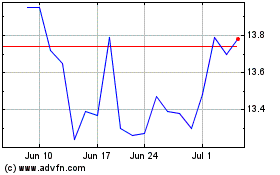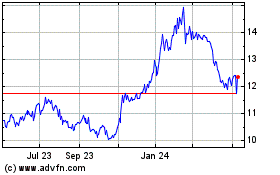Stronger Yen Dents Profit of Japan Inc. -- WSJ
July 26 2016 - 3:04AM
Dow Jones News
By Megumi Fujikawa
TOKYO -- Under pressure from a stronger yen, many Japanese
companies face further downgrades to their earnings projections for
the year, after a surge in the currency this past quarter eroded
profits.
Major Japanese businesses from Sony Corp. to Nintendo Co. will
this week release results for the quarter ended in June, in which
the yen strengthened more than 8% against the U.S. dollar. The
increase hit exporters that had earlier enjoyed the benefits of a
currency weakened by Prime Minister Shinzo Abe's aggressive
policies to revitalize Japan's economy.
The yen has been rising since late last year, posing a major
challenge to the so-called Abenomics program and the Bank of
Japan's efforts to cheapen the yen, which supports corporate
profits earned abroad. The dollar fell briefly below Yen100 last
month on the vote by the U.K. to leave the European Union.
"Because many companies made their full-year earnings guidance
based on a yen rate that is weaker than the current market rate, we
cannot expect boosts from foreign-exchange rates like we saw in the
past few years," said Kazuhito Yasumura, a senior quantitative
analyst at Mitsubishi UFJ Morgan Stanley Securities Co.
A stronger yen makes the products Japanese firms sell overseas
more expensive while eroding those profits when they are
repatriated.
The yen weakened in the past few weeks on hopes that the
government and the BOJ will introduce further fiscal and monetary
stimulus, although the movement won't be reflected in the
April-June results.
The negative impact of the yen's strength has been apparent in
results released this month.
Fast Retailing Co. Ltd. lowered its profit forecast for its
fiscal year ending Aug. 31. The owner of the Uniqlo brand has cut
its profit expectations by more than 60% since the start of the
year.
For Toyota Motor Corp., a weakening yen had been the
single-biggest contributor to profit growth for nearly three years.
Now the currency has changed course, "the tide has greatly
shifted," President Akio Toyoda said in May. The company said it
loses Yen40 billion ($377 million) in operating profit every time
Japan's currency strengthens by one yen against the dollar.
Toyota earlier this year said it expected profit to decline by
more than a third in the current financial year, which ends March
2017, based on an average rate for the period of Yen105 to the
dollar. On Monday, the yen was at about 106 to the dollar.
Daiwa Securities chief economist Kazuhiro Takahashi said the
auto sector likely was hit hard in the April-June quarter, and
estimates pretax profits of Japan's six major auto makers declined
by about 30% for the period.
In reports released earlier this year, nearly half of the 200
companies Daiwa Securities monitors made their projections based on
a rate of Yen110 to the dollar, according to the brokerage. It was
around Yen120 in early January.
If the dollar averages Yen105 or Yen100 for the financial year
that began April 1, ordinary profits by major Japanese
manufacturers are estimated to decline by up to about 20% or 26%,
respectively, according to a calculation made by SMBC Nikko
Securities chief market economist Yoshimasa Maruyama.
"The estimate is large enough to cause an extremely negative
impact, even after taking into account any expected cost-cutting
measures by the companies," Mr. Maruyama said.
A stronger yen deals a blow to an electronics sector already
struggling with tepid demand, according to Nomura Securities'
analysts. Many Japanese electronics companies have operations in
the U.K. and Brexit concerns could lead to currency fluctuations,
Nomura said.
The British pound fell sharply last month after the result of
the U.K. referendum increased uncertainties over the course of the
country's economy. The currency fell 15% against the yen between
April and June.
Hitachi Ltd. has a manufacturing site in the U.K. for a
high-speed railway contract it won in 2012. As the British plant
imports key components from Japan, the yen's appreciation against
sterling would be a concern, Nomura said.
Hitachi said it was fully hedged against foreign-exchange moves
on materials it ships to the U.K. from Japan, but sales earned in
the country could be affected by a higher yen when converted back
into the home currency.
Profits at Nintendo may be hit by the yen's appreciation as the
company holds ample cash in dollar and euro terms. Any impact from
the smash-hit smartphone game "Pokémon Go" launched earlier this
month won't be reflected in the results expected to be announced on
Wednesday.
For Sony, the yen's appreciation against the dollar and euro is
expected to have a muted effect. Sony said for every one yen of
strengthening against the dollar, it gains Yen5 billion in
operating profit, while every one yen of strengthening against the
euro takes away Yen5.5 billion.
A stronger yen isn't bad news for all companies. Japanese
furniture maker Nitori Holdings Co. Ltd. reported a record 43%
increase in profit for its March-May quarter. Nitori produces 90%
of its furniture overseas and imports it to sell in Japan.
Write to Megumi Fujikawa at megumi.fujikawa@wsj.com
(END) Dow Jones Newswires
July 26, 2016 02:49 ET (06:49 GMT)
Copyright (c) 2016 Dow Jones & Company, Inc.
Nintendo (PK) (USOTC:NTDOY)
Historical Stock Chart
From Mar 2024 to Apr 2024

Nintendo (PK) (USOTC:NTDOY)
Historical Stock Chart
From Apr 2023 to Apr 2024
